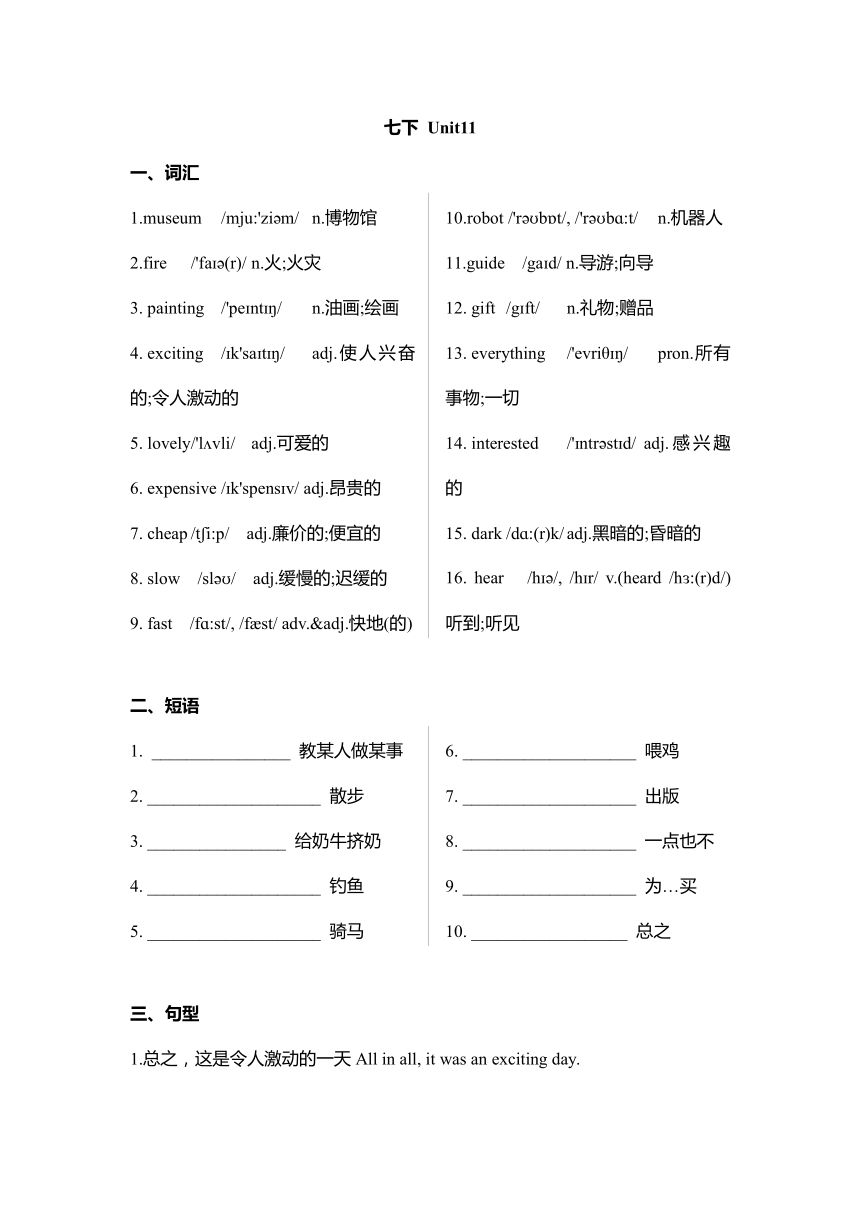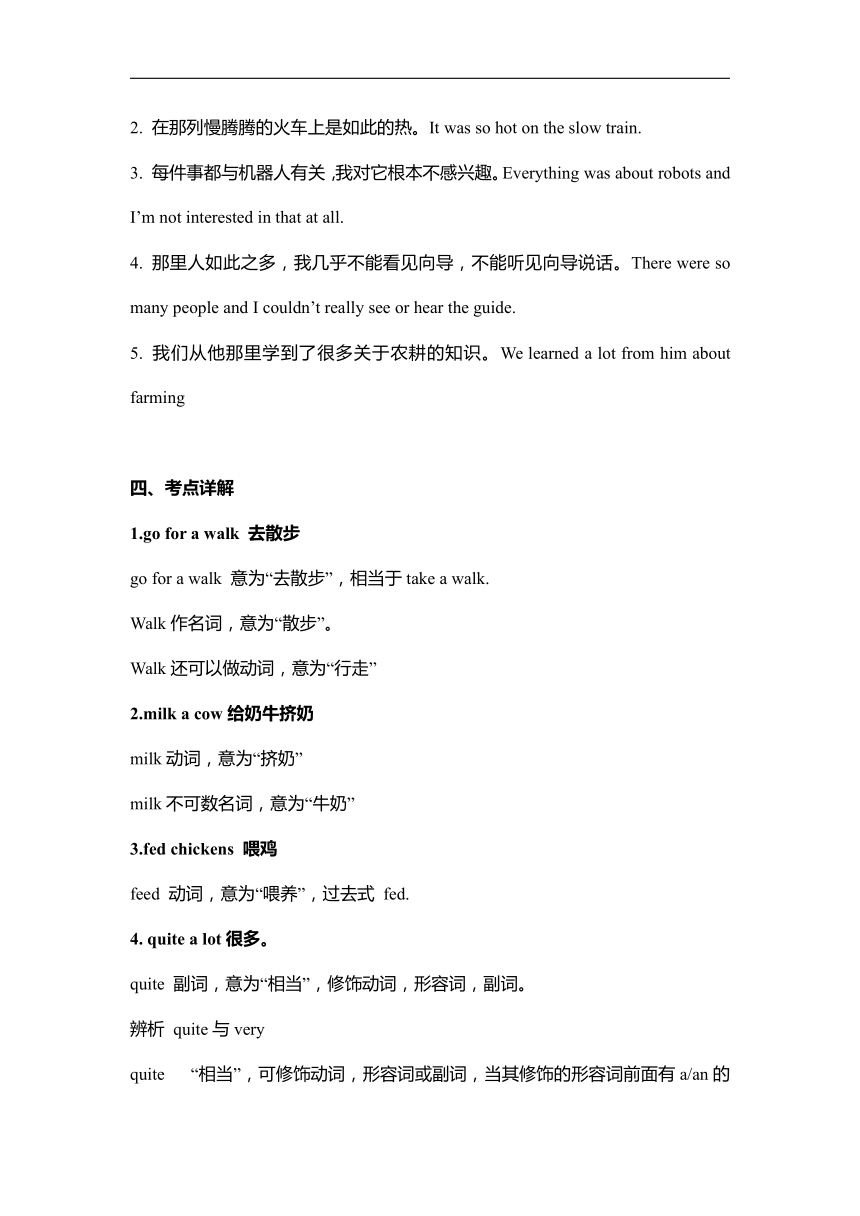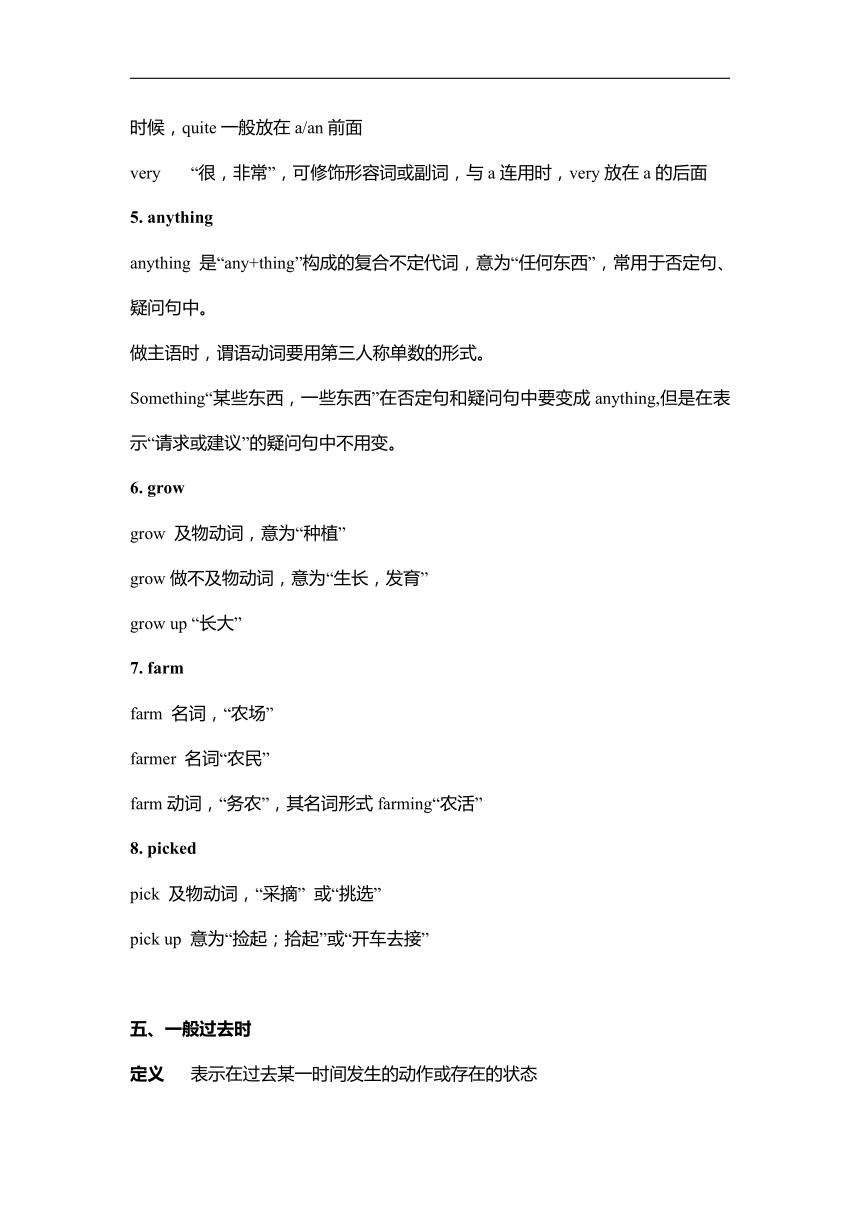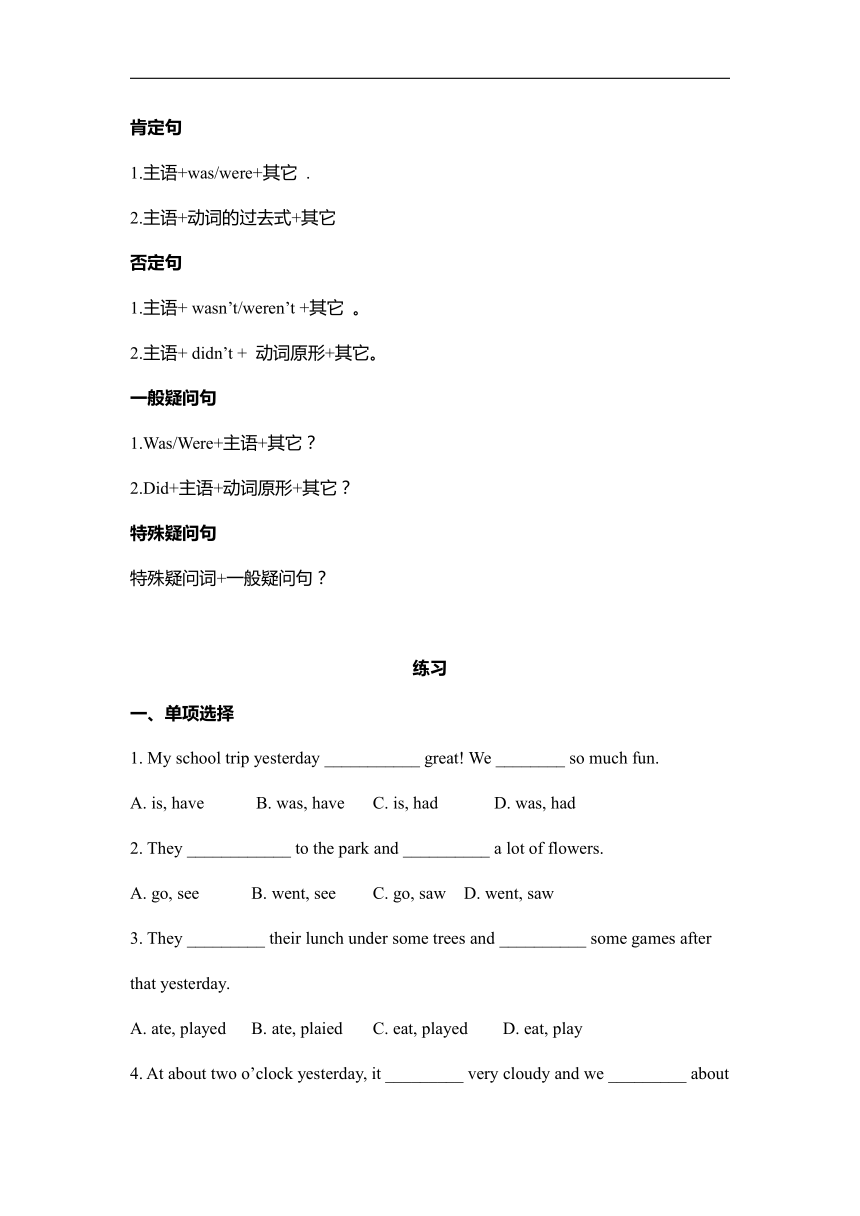人教新目标(Go for it)版七年级下册Unit 11 How was your school trip?考点详解及练习(无答案)
文档属性
| 名称 | 人教新目标(Go for it)版七年级下册Unit 11 How was your school trip?考点详解及练习(无答案) |

|
|
| 格式 | docx | ||
| 文件大小 | 26.7KB | ||
| 资源类型 | 教案 | ||
| 版本资源 | 人教新目标(Go for it)版 | ||
| 科目 | 英语 | ||
| 更新时间 | 2024-06-14 17:30:56 | ||
图片预览




文档简介
七下 Unit11
一、词汇
1.museum /mju:'zi m/ n.博物馆
2.fire /'fa (r)/ n.火;火灾
3. painting /'pe nt / n.油画;绘画
4. exciting / k'sa t / adj.使人兴奋的;令人激动的
5. lovely /'l vli/ adj.可爱的
6. expensive / k'spens v/ adj.昂贵的
7. cheap /t i:p/ adj.廉价的;便宜的
8. slow /sl / adj.缓慢的;迟缓的
9. fast /fɑ:st/, /f st/ adv.&adj.快地(的)
10.robot /'r b t/, /'r bɑ:t/ n.机器人
11.guide /ga d/ n.导游;向导
12. gift /g ft/ n.礼物;赠品
13. everything /'evriθ / pron.所有事物;一切
14. interested /' ntr st d/ adj.感兴趣的
15. dark /dɑ:(r)k/ adj.黑暗的;昏暗的
16. hear /h /, /h r/ v.(heard /h :(r)d/)听到;听见
短语
________________ 教某人做某事
2. ____________________ 散步
3. ________________ 给奶牛挤奶
4. ____________________ 钓鱼
5. ____________________ 骑马
6. ____________________ 喂鸡
7. ____________________ 出版
8. ____________________ 一点也不
9. ____________________ 为…买
10. __________________ 总之
句型
1.总之,这是令人激动的一天All in all, it was an exciting day.
2. 在那列慢腾腾的火车上是如此的热。It was so hot on the slow train.
3. 每件事都与机器人有关,我对它根本不感兴趣。Everything was about robots and I’m not interested in that at all.
4. 那里人如此之多,我几乎不能看见向导,不能听见向导说话。There were so many people and I couldn’t really see or hear the guide.
5. 我们从他那里学到了很多关于农耕的知识。We learned a lot from him about farming
四、考点详解
1.go for a walk 去散步
go for a walk 意为“去散步”,相当于take a walk.
Walk作名词,意为“散步”。
Walk还可以做动词,意为“行走”
2.milk a cow给奶牛挤奶
milk动词,意为“挤奶”
milk不可数名词,意为“牛奶”
3.fed chickens 喂鸡
feed 动词,意为“喂养”,过去式 fed.
4. quite a lot很多。
quite 副词,意为“相当”,修饰动词,形容词,副词。
辨析 quite与very
quite “相当”,可修饰动词,形容词或副词,当其修饰的形容词前面有a/an的时候,quite一般放在a/an前面
very “很,非常”,可修饰形容词或副词,与a连用时,very放在a的后面
5. anything
anything 是“any+thing”构成的复合不定代词,意为“任何东西”,常用于否定句、疑问句中。
做主语时,谓语动词要用第三人称单数的形式。
Something“某些东西,一些东西”在否定句和疑问句中要变成anything,但是在表示“请求或建议”的疑问句中不用变。
6. grow
grow 及物动词,意为“种植”
grow做不及物动词,意为“生长,发育”
grow up “长大”
7. farm
farm 名词,“农场”
farmer 名词“农民”
farm动词,“务农”,其名词形式farming“农活”
8. picked
pick 及物动词,“采摘” 或“挑选”
pick up 意为“捡起;拾起”或“开车去接”
五、一般过去时
定义 表示在过去某一时间发生的动作或存在的状态
肯定句
1.主语+was/were+其它 .
2.主语+动词的过去式+其它
否定句
1.主语+ wasn’t/weren’t +其它 。
2.主语+ didn’t + 动词原形+其它。
一般疑问句
1.Was/Were+主语+其它?
2.Did+主语+动词原形+其它?
特殊疑问句
特殊疑问词+一般疑问句?
练习
单项选择
1. My school trip yesterday ___________ great! We ________ so much fun.
A. is, have B. was, have C. is, had D. was, had
2. They ____________ to the park and __________ a lot of flowers.
A. go, see B. went, see C. go, saw D. went, saw
3. They _________ their lunch under some trees and __________ some games after that yesterday.
A. ate, played B. ate, plaied C. eat, played D. eat, play
4. At about two o’clock yesterday, it _________ very cloudy and we _________ about it would rain.
A. gets, worried B. got, worried
C. gets, worry D. got, worry
5._________, the clouds _________________ again!
A. Luckly, didn’t came B. Luckily, didn’t came
C. Luckily, didn’t come D. Luckly, didn’t come
6. Will you please say it again I ________ quite _______ you.
A. didn’t, hear B. don’t, heard C. didn’t, heard D. don’t, hear
7. ______ you ________ at six o’clock yesterday
A. Do ,get up B. Did, get up C. Do, got up D. Did, got up
8.What did you see _________
A. now B. every day C. these days D. just now
9.He went into the room and _______ the door.
A. lock B. locking C. locks D. locked
10. —What _____ you _______ last week —I bought a bag.
A. did ,buy B. did , bought C. do, buy D. do, bought
二、阅读
In Singapore, many middle school students spend(花费) a lot of time on their studies. People think good schooling can bring good future(未来). So, many of these students try their best to get good marks(分数) in their exams. They have a lot of homework every day and exams are usually difficult(困难的). Sometimes, some of them have to go to remedial(补习的) classes after school.
For the students in Singapore, there are many after-school activities: sports and games, music and dance, hiking and rock-climbing, etc. They are also very happy to do community service(社区服务). In their free time, most students like to listen to pop music. Hollywood blockbusters(好莱坞大片), Hong Kong and Singapore movies are very popular among(在……中间) them. Some of them also spend their free time surfing the Internet(网上冲浪), e-mailing their friends and playing computer games. They sometimes go to cafes(咖啡馆), fast-food restaurants, shopping centers and big bookstores. So, it looks like the life as a middle school student in Singapore is not easy but it is rich and colorful.
1.Why do most middle school students in Singapore spend their time on their studies ________
A.Because they like studies.
B.Because people think good schooling can bring good future.
C.Because their homework and exams are usually difficult.
D.Because their teachers ask them to go to remedial classes after school.
2.Which after-school activities aren’t mentioned(提及) in the passage ________
A.Helping with housework. B.Going hiking and rock-climbing.
C.Watching movies. D.Listening to pop music.
3.What do the students in Singapore do on the Internet in their free time ________
A.Have remedial classes. B.E-mail their parents.
C.Play computer games. D.Study on the Internet.
4.What is the life of the middle school students in Singapore like ________
A.Busy and boring. B.Easy but interesting.
C.Happy and popular. D.Difficult but rich and colorful.
三、用所给词的适当形式填空
1. _________ he __________ (fly) a kite last Sunday Yes, he _________.
2. Gao Shan ___________ (put) up the picture last night.
3. What _________ she __________ (find) in the garden last morning
4. Sorry, I ___________ (forget) your name.
5. Her father __________ (read) a newspaper last night.
6. I (brush)my teeth three times yesterday.
7.His mother often does some (read)in the evening.
8.I (not do)my homework last Monday.
9.Tom wants (be)an English teacher.
10.What she (do)yesterday
四、完成句子。
1. 你对英语感兴趣吗?
Are you ________ _________ English
2. 你能告诉我如何制机器人吗
Can you tell me ________ ________ ________ a robot
3. 他一点也不喜欢弹钢琴。
He _______like playing the piano________ ________.
4. 礼品店的东西太贵了,所以我什么也没买。
The things in the gift shop were _______ ________, _______ I didn’t buy anything.
5. 这个夏天我们去了乡下。
We _______ _______ the _______ this summer.
6.总的来说,这次旅行很棒。
,this trip was so great.
7.我对那部电影根本不感兴趣。
I in the movie .
8.我们的科学老师上节课教我们怎样制作风筝。
Our science teacher us make kites last class.
9.后来我哥哥发现学好英语真的很重要。
Later my brother found really important
English well.
10.学生学到了相当多的农事。
The students learn _______ a lot about _________.
五、句型转换
1、 Sarah’s weekend was great.(对划线部分提问)
______ ______ Sarah’s weekend
2、I cleaned the room with my friend.(对划线部分提问)
______ _______ you ______ with your friend
3、She did her homework last weekend .(改为否定句)
She ______ ______ her homework last weekend.
4、We went to the library last weekend.(改为一般疑问句)
______ you ______ to the library last weekend
5、Gina rides her bike to school every day.(用yesterday改写句子)
Gina ______ her bike to school _______.
一、词汇
1.museum /mju:'zi m/ n.博物馆
2.fire /'fa (r)/ n.火;火灾
3. painting /'pe nt / n.油画;绘画
4. exciting / k'sa t / adj.使人兴奋的;令人激动的
5. lovely /'l vli/ adj.可爱的
6. expensive / k'spens v/ adj.昂贵的
7. cheap /t i:p/ adj.廉价的;便宜的
8. slow /sl / adj.缓慢的;迟缓的
9. fast /fɑ:st/, /f st/ adv.&adj.快地(的)
10.robot /'r b t/, /'r bɑ:t/ n.机器人
11.guide /ga d/ n.导游;向导
12. gift /g ft/ n.礼物;赠品
13. everything /'evriθ / pron.所有事物;一切
14. interested /' ntr st d/ adj.感兴趣的
15. dark /dɑ:(r)k/ adj.黑暗的;昏暗的
16. hear /h /, /h r/ v.(heard /h :(r)d/)听到;听见
短语
________________ 教某人做某事
2. ____________________ 散步
3. ________________ 给奶牛挤奶
4. ____________________ 钓鱼
5. ____________________ 骑马
6. ____________________ 喂鸡
7. ____________________ 出版
8. ____________________ 一点也不
9. ____________________ 为…买
10. __________________ 总之
句型
1.总之,这是令人激动的一天All in all, it was an exciting day.
2. 在那列慢腾腾的火车上是如此的热。It was so hot on the slow train.
3. 每件事都与机器人有关,我对它根本不感兴趣。Everything was about robots and I’m not interested in that at all.
4. 那里人如此之多,我几乎不能看见向导,不能听见向导说话。There were so many people and I couldn’t really see or hear the guide.
5. 我们从他那里学到了很多关于农耕的知识。We learned a lot from him about farming
四、考点详解
1.go for a walk 去散步
go for a walk 意为“去散步”,相当于take a walk.
Walk作名词,意为“散步”。
Walk还可以做动词,意为“行走”
2.milk a cow给奶牛挤奶
milk动词,意为“挤奶”
milk不可数名词,意为“牛奶”
3.fed chickens 喂鸡
feed 动词,意为“喂养”,过去式 fed.
4. quite a lot很多。
quite 副词,意为“相当”,修饰动词,形容词,副词。
辨析 quite与very
quite “相当”,可修饰动词,形容词或副词,当其修饰的形容词前面有a/an的时候,quite一般放在a/an前面
very “很,非常”,可修饰形容词或副词,与a连用时,very放在a的后面
5. anything
anything 是“any+thing”构成的复合不定代词,意为“任何东西”,常用于否定句、疑问句中。
做主语时,谓语动词要用第三人称单数的形式。
Something“某些东西,一些东西”在否定句和疑问句中要变成anything,但是在表示“请求或建议”的疑问句中不用变。
6. grow
grow 及物动词,意为“种植”
grow做不及物动词,意为“生长,发育”
grow up “长大”
7. farm
farm 名词,“农场”
farmer 名词“农民”
farm动词,“务农”,其名词形式farming“农活”
8. picked
pick 及物动词,“采摘” 或“挑选”
pick up 意为“捡起;拾起”或“开车去接”
五、一般过去时
定义 表示在过去某一时间发生的动作或存在的状态
肯定句
1.主语+was/were+其它 .
2.主语+动词的过去式+其它
否定句
1.主语+ wasn’t/weren’t +其它 。
2.主语+ didn’t + 动词原形+其它。
一般疑问句
1.Was/Were+主语+其它?
2.Did+主语+动词原形+其它?
特殊疑问句
特殊疑问词+一般疑问句?
练习
单项选择
1. My school trip yesterday ___________ great! We ________ so much fun.
A. is, have B. was, have C. is, had D. was, had
2. They ____________ to the park and __________ a lot of flowers.
A. go, see B. went, see C. go, saw D. went, saw
3. They _________ their lunch under some trees and __________ some games after that yesterday.
A. ate, played B. ate, plaied C. eat, played D. eat, play
4. At about two o’clock yesterday, it _________ very cloudy and we _________ about it would rain.
A. gets, worried B. got, worried
C. gets, worry D. got, worry
5._________, the clouds _________________ again!
A. Luckly, didn’t came B. Luckily, didn’t came
C. Luckily, didn’t come D. Luckly, didn’t come
6. Will you please say it again I ________ quite _______ you.
A. didn’t, hear B. don’t, heard C. didn’t, heard D. don’t, hear
7. ______ you ________ at six o’clock yesterday
A. Do ,get up B. Did, get up C. Do, got up D. Did, got up
8.What did you see _________
A. now B. every day C. these days D. just now
9.He went into the room and _______ the door.
A. lock B. locking C. locks D. locked
10. —What _____ you _______ last week —I bought a bag.
A. did ,buy B. did , bought C. do, buy D. do, bought
二、阅读
In Singapore, many middle school students spend(花费) a lot of time on their studies. People think good schooling can bring good future(未来). So, many of these students try their best to get good marks(分数) in their exams. They have a lot of homework every day and exams are usually difficult(困难的). Sometimes, some of them have to go to remedial(补习的) classes after school.
For the students in Singapore, there are many after-school activities: sports and games, music and dance, hiking and rock-climbing, etc. They are also very happy to do community service(社区服务). In their free time, most students like to listen to pop music. Hollywood blockbusters(好莱坞大片), Hong Kong and Singapore movies are very popular among(在……中间) them. Some of them also spend their free time surfing the Internet(网上冲浪), e-mailing their friends and playing computer games. They sometimes go to cafes(咖啡馆), fast-food restaurants, shopping centers and big bookstores. So, it looks like the life as a middle school student in Singapore is not easy but it is rich and colorful.
1.Why do most middle school students in Singapore spend their time on their studies ________
A.Because they like studies.
B.Because people think good schooling can bring good future.
C.Because their homework and exams are usually difficult.
D.Because their teachers ask them to go to remedial classes after school.
2.Which after-school activities aren’t mentioned(提及) in the passage ________
A.Helping with housework. B.Going hiking and rock-climbing.
C.Watching movies. D.Listening to pop music.
3.What do the students in Singapore do on the Internet in their free time ________
A.Have remedial classes. B.E-mail their parents.
C.Play computer games. D.Study on the Internet.
4.What is the life of the middle school students in Singapore like ________
A.Busy and boring. B.Easy but interesting.
C.Happy and popular. D.Difficult but rich and colorful.
三、用所给词的适当形式填空
1. _________ he __________ (fly) a kite last Sunday Yes, he _________.
2. Gao Shan ___________ (put) up the picture last night.
3. What _________ she __________ (find) in the garden last morning
4. Sorry, I ___________ (forget) your name.
5. Her father __________ (read) a newspaper last night.
6. I (brush)my teeth three times yesterday.
7.His mother often does some (read)in the evening.
8.I (not do)my homework last Monday.
9.Tom wants (be)an English teacher.
10.What she (do)yesterday
四、完成句子。
1. 你对英语感兴趣吗?
Are you ________ _________ English
2. 你能告诉我如何制机器人吗
Can you tell me ________ ________ ________ a robot
3. 他一点也不喜欢弹钢琴。
He _______like playing the piano________ ________.
4. 礼品店的东西太贵了,所以我什么也没买。
The things in the gift shop were _______ ________, _______ I didn’t buy anything.
5. 这个夏天我们去了乡下。
We _______ _______ the _______ this summer.
6.总的来说,这次旅行很棒。
,this trip was so great.
7.我对那部电影根本不感兴趣。
I in the movie .
8.我们的科学老师上节课教我们怎样制作风筝。
Our science teacher us make kites last class.
9.后来我哥哥发现学好英语真的很重要。
Later my brother found really important
English well.
10.学生学到了相当多的农事。
The students learn _______ a lot about _________.
五、句型转换
1、 Sarah’s weekend was great.(对划线部分提问)
______ ______ Sarah’s weekend
2、I cleaned the room with my friend.(对划线部分提问)
______ _______ you ______ with your friend
3、She did her homework last weekend .(改为否定句)
She ______ ______ her homework last weekend.
4、We went to the library last weekend.(改为一般疑问句)
______ you ______ to the library last weekend
5、Gina rides her bike to school every day.(用yesterday改写句子)
Gina ______ her bike to school _______.
同课章节目录
- Unit 1 Can you play the guitar?
- Section A
- Section B
- Unit 2 What time do you go to school?
- Section A
- Section B
- Unit 3 How do you get to school?
- Section A
- Section B
- Unit 4 Don't eat in class.
- Section A
- Section B
- Unit 5 Why do you like pandas?
- Section A
- Section B
- Unit 6 I'm watching TV.
- Section A
- Section B
- Review of Units 1-6
- Unit 7 It's raining!
- Section A
- Section B
- Unit 8 Is there a post office near here?
- Section A
- Section B
- Unit 9 What does he look like?
- Section A
- Section B
- Unit 10 I'd like some noodles.
- Section A
- Section B
- Unit 11 How was your school trip?
- Section A
- Section B
- Unit 12 What did you do last weekend?
- Section A
- Section B
